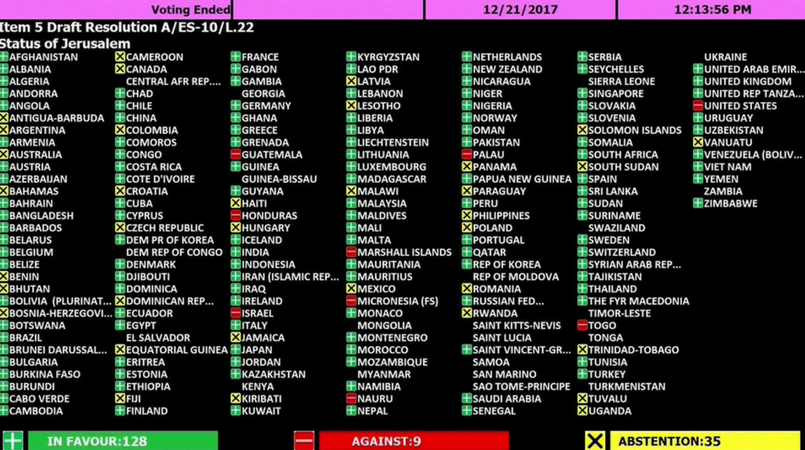
Papua New Guinea is one of 128 United Nations member countries who voted to reject the United States’ move to recognise Jerusalem as the capital of Israel.
The vote was taken during an emergency meeting which was held on Thursday (21/12/2017) at the United Nations Headquarters in New York.
The vote came after threats by the US ambassador to the UN, Nikki Haley, who said Washington would remember which countries “disrespected” America by voting against it.
“The United States will remember this day in which it was singled out for attack in the general assembly for the very act of exercising our right as a sovereign nation.
“We will remember it when we will be called upon once again to make the world’s largest contribution to the United Nations.
“And we will remember it when so many countries come calling on us, as they often do, to pay even more and to use our influence for their benefit.
“America will put our embassy in Jerusalem that is what the American people want us to do and it is the right thing to do.
“No vote in the United Nations will make any difference on that but this vote will make a difference on how Americans look at the UN, and on how we look at countries who disrespect us in the UN.
“And this vote will be remembered.”
But despite this threat, the 128 countries voted to reject President Donald Trump’s unilateral decision to make Jerusalem Israel’s capital.
The 9 countries who sided with the US included Guatemala, Honduras, Israel, Marshall Islands, Federated states of Micronesia, Nauru, Palau and Togo.
Notably out of the 35 countries who abstained from voting, those in the Pacific included Australia, Fiji, Kiribati, Tuvalu and Vanuatu.
Another 21 delegations were absent physically from the vote, suggesting Trump’s warning over funding cuts and Israel’s lobbying may have had some effect.
Minister for Foreign affairs and Trade, Rimbink Pato, is yet to respond to this newsroom in regards to PNG’s stance on the matter.
The vote goes to show the U.N. still maintains its position on Jerusalem.
In October 2009, the U.N.’s Secretary-General Ban Ki-moon warned that Jerusalem must be the capital of both Israel and Palestine – living side-by-side in peace and security, with arrangements for the holy sites acceptable to all – for peace in the Middle East to be achieved.
“This is the road to the fulfillment of both the vision of [U.N.] Security Council resolutions and the Arab Peace Initiative, and the yearning for peace of people from all over the world,” said Ban Ki-moon.
The status of Jerusalem remains a crucial issue in the ongoing Israeli-Palestinian conflict.
Israel remains determined that Jerusalem be its undivided capital, while Palestinians are seeking to establish their capital in East Jerusalem.
